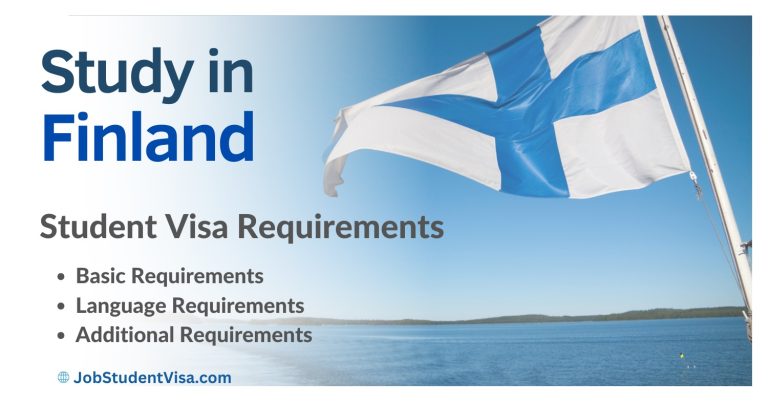Student Visa Requirements for Germany
Applying for a student visa to study in Germany is a critical step for international students aiming to pursue their academic dreams in this renowned educational hub. Germany, known for its world-class universities, cutting-edge research, and affordable education, attracts thousands of students from around the globe each year. The student visa process for Germany is straightforward but requires careful attention to detail and adherence to specific requirements.
To begin, applicants must secure admission to a German university. Following this, the student visa application involves gathering a set of required documents, such as proof of admission, financial stability, health insurance, and language proficiency. The process typically includes filling out an application form, scheduling a visa interview, and attending it at the German embassy or consulate in your home country. Throughout this journey, it’s essential to stay informed and organized to ensure a smooth and successful visa application experience, paving the way to an enriching academic journey in Germany.

Student Visa Requirements for Germany
Applying for a student visa to study in Germany, whether for undergraduate, postgraduate, or PhD studies, involves a detailed process with several key requirements. Here’s a comprehensive breakdown of each step and requirement.
Passport and Visa Application
- Essentials: A valid passport is the fundamental requirement. It should have a validity that covers the duration of your intended stay in Germany.
- Application Process: The visa application process begins by filling out the required forms, which are usually available online on the official website of the German Embassy or Consulate in your home country. The form should be filled out accurately and completely.
Proof of Health Insurance
- Mandatory Requirement: Proof of health insurance is crucial for a visa application. This demonstrates that you will have access to necessary healthcare during your stay in Germany.
- Type of Insurance: For EU students, the European Health Insurance Card (EHIC) is typically sufficient. Non-EU students need to arrange for private or public health insurance in Germany.
Proof of Financial Resources
- Amount: As of 2024, you need to demonstrate financial stability with at least €11,208 per year.
- Blocked Account: A common method to prove financial resources is through a blocked account, which is a special type of bank account in Germany designed for international students. You deposit the required amount into this account, and you can withdraw a fixed amount monthly to cover your living expenses.
Proof of Language Proficiency
- German-Taught Programs: For courses taught in German, you need to provide evidence of German language proficiency through standardized tests like DSH or TestDaF.
- English-Taught Programs: For English-taught programs, non-native English speakers must provide English proficiency test results, such as IELTS or TOEFL scores.
Academic Transcripts and Certificates
- Documentation: You must submit your academic transcripts and certificates from your previous educational institutions. These documents should be officially recognized and, if necessary, translated into German or English.
Letter of Acceptance from a University
- Admission Confirmation: A letter of acceptance from a German university is a crucial document for your visa application. It proves that you have been admitted to a study program in Germany.
Visa Types
- Student Applicant Visa: This is suitable if you are still in the process of getting admitted to a university. It’s initially issued for three months and can be extended for another six months.
- Full Student Visa: Required when you have received admission from a university. This visa is specific to your study program and duration.
Visa and Residence Permit Process
- Application Timing: It’s recommended to apply for the visa immediately after receiving your university admission letter.
- Residence Registration: Once in Germany, you need to register at the local Resident’s Office with your address.
- University Enrollment: Enroll in your university and complete all necessary administrative procedures.
- Residence Permit Application: After enrollment, apply for a residence permit at the local Foreigner’s Authority in Germany.
Specific Requirements for PhD Students
- Structured PhD Programs: In Germany, these programs often include a combination of mentorship, classes, and collaborative learning, similar to the PhD structure in English-speaking countries.
Additional Considerations
- Health Insurance Details: Non-EU students must have health insurance from either public or private German providers if they cannot use their home country’s insurance.
- Accommodation: Finding and registering a place to live in Germany is important. The cost and type of accommodation (like student halls or private apartments) can vary significantly.
Language Requirements Details
- Undergraduate and Postgraduate Levels: For German-taught programs, language proficiency is usually assessed through DSH or TestDaF exams. For English-taught programs, IELTS or TOEFL scores are standard.
- PhD Level: Language proficiency in the language of your thesis (German or English) is required.
English Language Requirements Details
The minimum English language requirements for studying at German universities, such as IELTS and TOEFL scores, vary depending on the university and the level of study (undergraduate, postgraduate, or PhD). Here’s a comprehensive overview based on various sources:
IELTS Requirements
- General Requirements: German universities typically require an IELTS score ranging from 4.5 to 6.5 for admission. This range varies based on the university and the specific program.
- Specific University Requirements:
- University of Konstanz: A minimum of 5.5.
- University of Giessen: A minimum of 6.
- Berlin School of Business and Innovation: 6 or above.
- Technical University of Munich: 6.5.
- University of Gottingen: 6 (7 for an M.Sc in Mathematics).
- University of Hamburg: Ranges between 4.5 and 6.5 depending on the course.
- Course-Wise Requirements:
- Engineering and Technology: 6.5 to 7.0.
- Business and Economics: 6.5 to 7.0.
- Sciences and Medicine: 7.0 or higher.
- Humanities and Arts: 6.0 to 6.5.
TOEFL Requirements
- General Requirements: TOEFL requirements also vary significantly among universities and courses. The scores range from about 61 to over 100.
- Specific University Requirements:
- LMU Munich: 80.
- Heidelberg University: 90.
- Charité – Universitätsmedizin Berlin: 92.
- University of Tuebingen: Above 79.
- Technische Universität Dresden: Above 90.
- Humboldt University of Berlin: 79.
- University of Freiburg: Above 100.
- University of Cologne: Above 100.
- University of Bayreuth: 90.
- University of Duisburg: 61.
- Karlsruhe Institute of Technology: Above 88.
- University of Bonn: 80.
Other Considerations
- Visa Requirements: The IELTS score required for a student visa may align with the university’s minimum requirement, typically in the range of 6.0 to 7.0. However, visa requirements can vary depending on nationality and study duration.
- Variability: Some programs and universities may have different or additional language proficiency requirements, or they might accept other English language proficiency tests like the Cambridge English exams.
- Research Is Key: It’s important for prospective students to research the specific language requirements of their chosen program and university to ensure they meet the necessary criteria.
In summary, while there is a general
Application Timing Details
- Visa Processing Time: The visa application process typically takes up to 25 days, but can vary depending on the embassy and individual circumstances. For PhD students, it’s crucial to apply as early as possible as the process can take several months.
Visa Costs
- Fees: The cost for a German student visa is approximately €75. The initial application fee for a residence permit is up to €110, and up to €100 for an extension.
Each step in the visa application process requires careful attention to detail and thorough preparation of documents. It’s advisable to start the process early, ensure all documents are in order, and comply with all the requirements set by the German Embassy or Consulate in your home country.
The range for required English proficiency scores for German universities, the exact requirement can vary significantly based on the university, the specific program, and the level of study. Prospective students should carefully check the requirements for their specific programs and prepare accordingly.
In conclusion, obtaining a student visa for Germany is a structured yet manageable process that opens the door to a world of academic opportunities. It demands meticulous preparation, from securing a university admission to compiling the necessary documents and attending the visa interview. Aspiring students should approach this process with diligence and attention to detail. Successfully navigating through these steps not only leads to the issuance of a student visa but also marks the beginning of an exciting educational adventure in a country celebrated for its academic excellence and rich cultural heritage. With the right preparation and mindset, students can look forward to an enriching and transformative experience studying in Germany.






